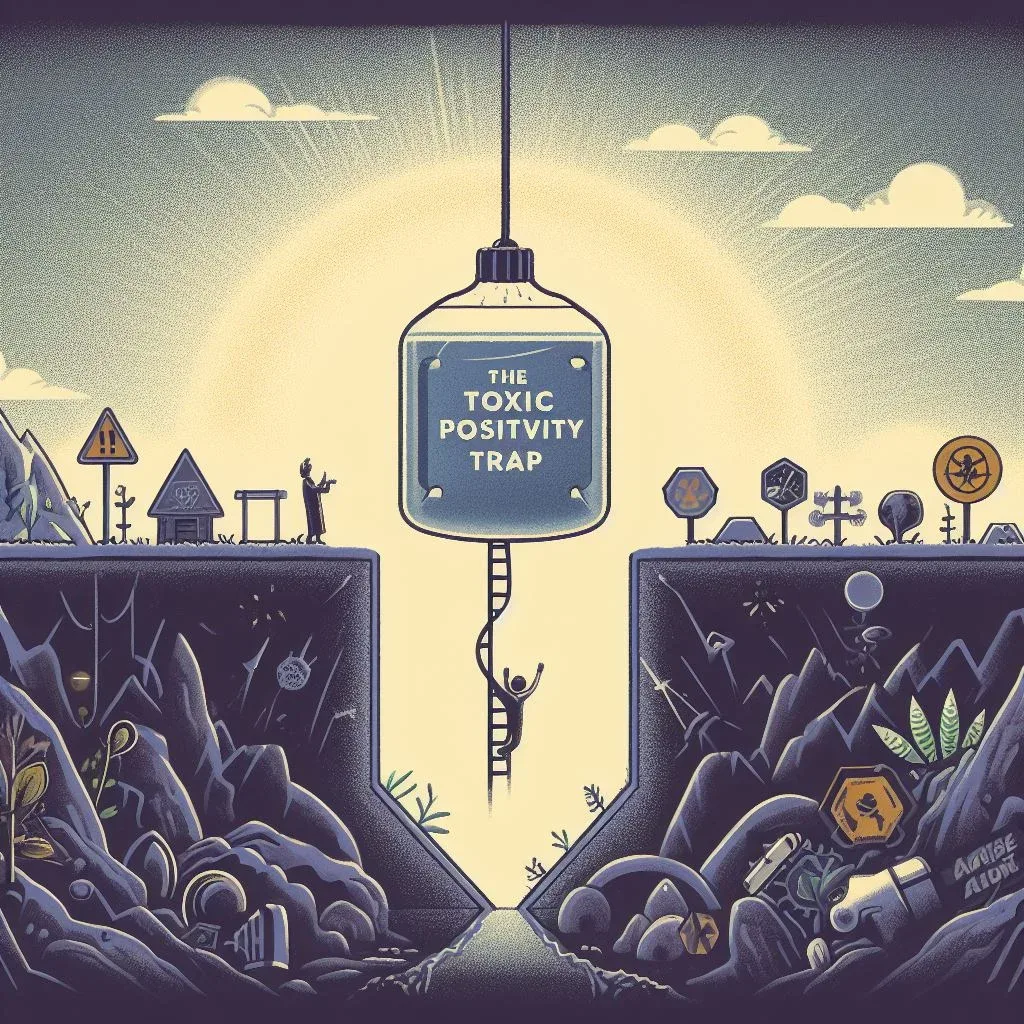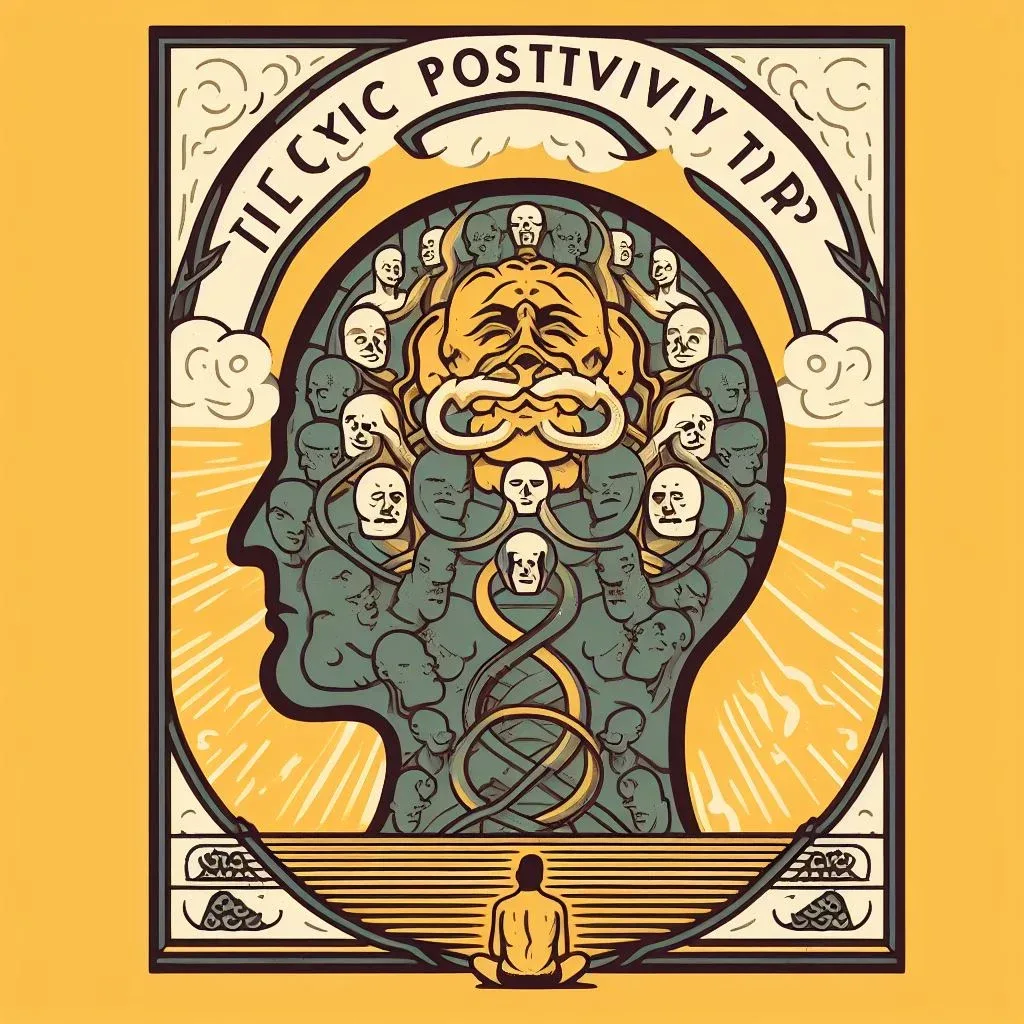In a world that often values positivity above all else, so-called “toxic positivity” emerges as an important topic of discussion. This article explores what toxic positivity is, its consequences and how philosophy, in particular Stoicism, can provide us with a more balanced and realistic approach to dealing with life's challenges.

What is Toxic Positivity?
Toxic positivity is the relentless insistence on maintaining a positive attitude, even in the face of genuine adversity. This can manifest as the refusal to acknowledge negative emotions, the pressure to maintain a constant facade of happiness, or the denial of any experience that is not strictly positive. While it's important to cultivate an optimistic mindset, toxic positivity ignores the complexity of human life.
The Consequences of Toxic Positivity

The relentless pursuit of positivity at all costs can have several negative consequences:
- Emotional Repression: Denying negative emotions can lead to emotional repression, which can be harmful in the long run.
- Inauthenticity: Maintaining a constant facade of happiness can result in a lack of authenticity and real connection with others.
- Judgment of Emotions: Toxic positivity often involves judging negative emotions as wrong, creating unnecessary guilt.
- Loss of Resilience: Avoiding adversity rather than facing it can undermine resilience.
Stoicism and the Balanced View of Life
Stoicism, an ancient philosophy founded by philosophers such as Seneca, Epictetus, and Marcus Aurelius, offers a balanced view of life that contrasts with toxic positivity. Stoics recognize that life is full of ups and downs, and that facing challenges is inevitable.
Stoic Principles for Dealing with Toxic Positivity

- Acceptance of Emotions: Stoics teach that all emotions, both positive and negative, are a natural part of the human experience. Instead of repressing them, accept and understand them.
- Focus on what we control: Stoics emphasize the importance of focusing on what we can control and accepting what is beyond our control. This helps avoid the frustration caused by trying to control the uncontrollable.
- Stoic Virtues: Stoic philosophy promotes virtues such as courage, wisdom and justice. Developing these virtues is more important than constantly seeking happiness.
- Meditation on Death: The Stoics practiced “memento mori” (remember you are going to die) to maintain a realistic perspective on life and appreciate the present.
How Stoicism Can Combat Toxic Positivity
By adopting Stoic principles, we can approach toxic positivity in healthier ways:
- Accepting Negative Emotions: Recognize that negative emotions are a natural part of life. Don't judge yourself for feeling them.
- Practice Acceptance: Learn to accept the circumstances you cannot change and focus on what is within your control.
- Cultivate Virtues: Develop virtues such as courage and resilience to face life's challenges in a constructive way.
- Reflect on Impermanence: Remember the impermanence of life and the importance of enjoying the present.
Conclusion: Balance and Authenticity
Toxic positivity can create a false illusion of happiness and prevent personal growth. Stoicism offers a balanced approach that allows us to embrace all facets of life, whether positive or negative. Cultivating acceptance, authenticity, and resilience can help us face life's challenges in healthier, more meaningful ways.
Remember that as human beings we are complex, and our emotions reflect that complexity. Accepting and embracing this complexity is one of the fundamental principles of Stoicism, which invites us to a more authentic and balanced life.
FAQ – Toxic Positivity: A Philosophical Approach to Stoicism
In this FAQ, we will address common questions related to the topic of toxic positivity and its relationship to Stoicism.

1. What is toxic positivity?
Toxic positivity is the relentless pursuit of maintaining a positive attitude, even in the face of genuine adversity. This can result in denial of negative emotions and pressure to maintain a constant facade of happiness.
2. What are the consequences of toxic positivity?
The consequences of toxic positivity include emotional repression, inauthenticity, judgment of negative emotions, and loss of resilience.
3. What is Stoicism?
Stoicism is an ancient philosophy that teaches the importance of accepting emotions, focusing on what we can control, cultivating virtues such as courage and justice, and reflecting on the impermanence of life.
4. How does Stoicism combat toxic positivity?
Stoicism combats toxic positivity by promoting the acceptance of negative emotions, the practice of accepting what is beyond our control, the cultivation of virtues and reflection on the impermanence of life.
5. Can I adopt Stoic principles in my daily life?
Yes, Stoic principles are highly applicable to everyday life. You can practice acceptance, focusing on what you can control, cultivating virtues, and reflecting on impermanence in your daily routine.
6. Does Stoic philosophy promote the denial of positive emotions?
No, Stoic philosophy does not deny positive emotions. She emphasizes the importance of accepting all emotions, both positive and negative, as part of the human experience.
7. How can I start adopting Stoic principles in my life?
You can start by reading works by Stoic philosophers like Seneca, Epictetus, and Marcus Aurelius, and practicing reflecting on Stoic principles in your daily life.
8. Is Stoicism compatible with other philosophies or beliefs?
Yes, Stoicism can be compatible with other philosophies or beliefs, and many people combine Stoic principles with their own beliefs and values.
Stoicism offers a balanced approach to dealing with life's complexities, promoting authenticity, personal growth and resilience.





